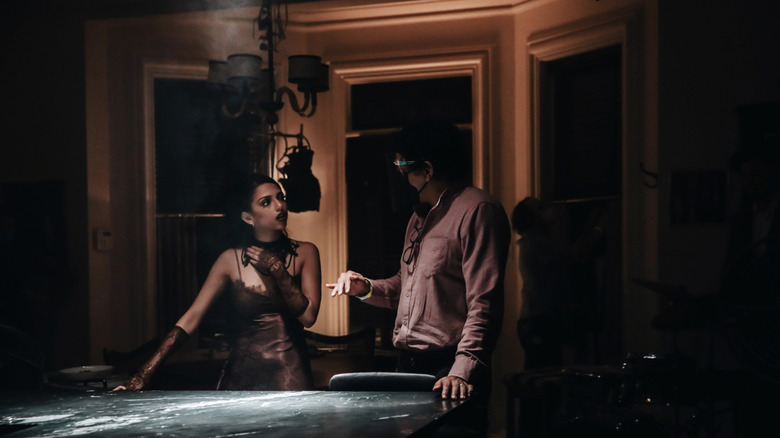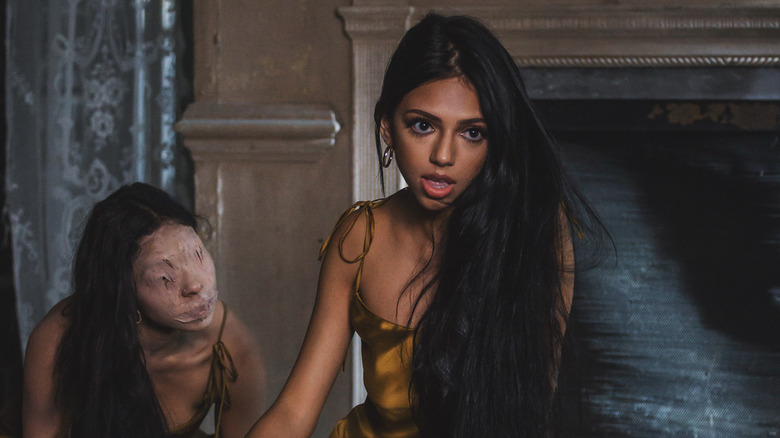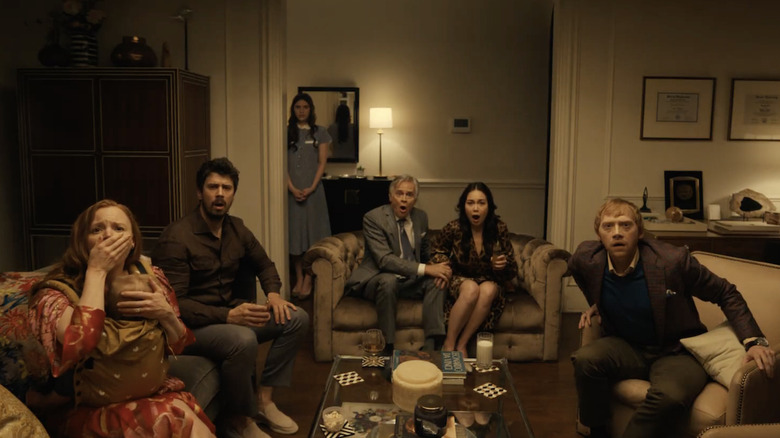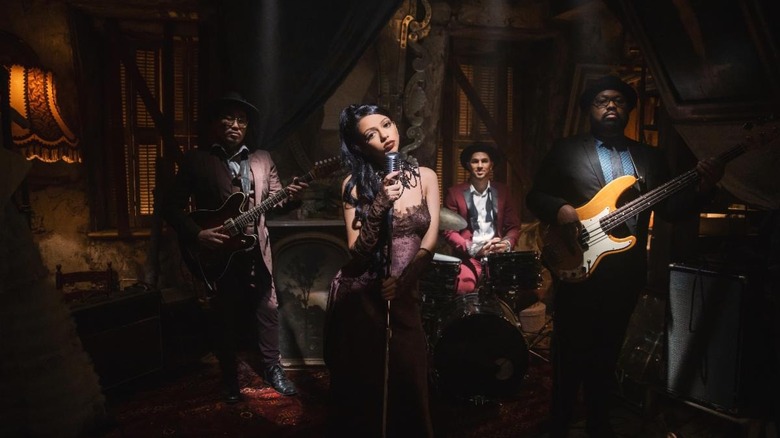Musician Saleka Shyamalan On Collaborating With Family And Making Original Songs For 'Servant' [Interview]
The Shyamalan family business is creativity — and Saleka Shyamalan is the musician of the family. The singer-songwriter, who studied music at Brown University, is one of the creative forces behind "Servant." She's produced a handful of original songs for the horror series, including its most recent original song, "There Is A Place." Often, her songs provide moments of clarity and transformation for Leanne Grayson (Nell Tiger Free).
Season three of the Apple TV+ series is, as Saleka agrees, the most compelling chapter yet. It's faster, nastier, and turns the danger and paranoia up to an all-time series' high. Saleka's songs, however, can provide breathers and a rare sense of calm in the series. The R&B artist writes based on the scripts, not the finished episodes, which is a process she told us about during an interview all about her creative process, influences, and working with her father, M. Night Shyamalan, and her sister, writer-director Ishana Shyamalan.
'There's so much imagery to draw from'
When writing a song for "Servant," where do you start? What inspires you?
I'm writing based on a script. In "Servant," the songs are supposed to be connected to Leanne's character and her arc. As she's becoming more independent and realizing her power, her strength, experimenting with her sensuality and womanhood and what that means to her. The songs reflect her in these moments of transition, and moments of growth, I would say. She turns to the songs in those moments. They're not exactly on the nose, like lyrically in line with her story, but representing these things that she's experiencing for the first time, whether it's love or lust or loss or jealousy or self doubt or the desire for acceptance.
I take those themes and inspirations from the script and then embellish upon them in the songs. And then of course, you write from your own experience. I'm trying to connect to Leanne and there's a lot that I think everyone can relate to within the show. Even though it's very crazy and has supernatural elements, I think there's a lot of very universal themes [that are] part of it, the familial aspects and the love. I try to see what can I connect to with Leanne and then write from that.
Honestly, it's super easy to write for "Servant," because I'm writing to create a narrative arc for a girl who's essentially my age. Her character is crazy, but there's so much there that I can relate to, in terms of the desire for love and acceptance, and figuring out your strengths, and feeling insecure, and feeling doubt and just finding yourself and breaking free of boundaries that you've had for your life.
When she's dancing to your song in a recent episode, it's like a lightbulb is going off. You definitely see some liberation.
There's the feeling of liberation, but also a little bit of mourning and a little bit of grieving. Finding strength through that, realizing and acknowledging the pain that you've been through and the loss that you've been through, and turning that into power. It's an overarching theme for the character of Vivian Dale and "Servant" as a whole. I think I wanted to accentuate that in particular in the song. The lyrics themselves are not necessarily about liberation and freedom; they're more about longing. I wanted the chords and the production to feel that way, to feel warm and light and uplifting.
There's a sense of doom, too, like "the house is crumbling," as it is crumbling.
Very dramatic, I guess, yes. I don't necessarily think of it as doom. The house crumbling is sort of a metaphor for a house [as] a space of belonging. And a metaphor for the relationship, like the structure that's supposed to keep you safe and protect you. You're supposed to feel free within and it's falling apart around you. I don't like to think of it as the world ending necessarily, but it's all metaphoric for that.
I think when you're young and feeling love and heartbreak and loss, sometimes it does feel very dramatic and the world is crumbling around you. I think at the end of the day, I try to have some balance of that where, even if it does feel like doom, and we're talking about something like the world falling apart around you or a house falling apart around you, that there is a glimmer of hope at the end, or at least throughout. That there's some strength or even in expressing this, even in just taking this pain and making something from it, that is a source of hope and positivity in itself.
Season three is much more aggressive, so how was it different writing for this season compared to the past?
It's interesting because the show turns from drama in the first season into something a little bit more scary and supernatural and [suspenseful]. But I think that the tone was pretty established. I just knew going into it, that there's kind of a sonic space that I wanted to live in, which was this kind of minor bluesy, jazz kind of quality. And so, that didn't really change necessarily, but it did give me more imagination to play with lyrically. There's so much imagery to draw from. And even though it's not necessarily helpful in the show for me when I'm reading the scripts and writing them, I love to insinuate about imagery that I've read in the scripts.
It's the flowers falling from trees or even the house crumbling, life and death, people coming back to life, those things. They're not necessarily connected to this song itself, and the song doesn't really need to have that element in it. For me, it's exciting to draw on imagery that's going on in the show. Because the show has many more crazy things happening in the third season, there was a little more of it to draw from.
When you made the song for "Old," had you not seen the movie?
No, actually, so I had to write that song before they even started shooting the movie. The first day of the shoot, they had the opening scene of the movie where the little girl is singing the song in the car. I had to have written it and sent it to the actresses and they had to learn it before the shoot even started. Everything that I wrote for the song was completely based off of reading the script. But honestly, the script is descriptive and powerful and emotional that it wasn't hard at all to write based off of that. There was so much that I connected with, so I think it was all that I needed. It was an interesting process to have the song written and then to see it in the movie where I had never seen any of the visuals.
They actually ended up using it more than was intended. It was supposed to be that one scene at the beginning and the end. They added it in places. It was cool to see how it eventually became incorporated. My dad wrote it, and it's so much based off of our family and our experiences [with] the things that we talk about in our daily lives. It was this existential feeling that probably so many people are thinking about after the pandemic, of time moving and life going by and how fast it goes. It was very easy to connect with the experiences of the family. Ironically, the character that sings the song in the movie is lightly based off of me and my dynamics with my parents and kind of our family.
'Make it feel minimal and bare but powerful'
There's such a feeling of obsession through your father's work and the show. Themes and ideas constantly circling back. For you, artistically, what are your obsessions?
I think obsession-wise, musically, it changes through time. I would say I really love jazz music and I really love R&B music, and that's the music that I grew up listening to. It's always my sonic home, I would say, genre-wise. I played classical piano growing up. And so, classical piano and creating from the piano is usually where I start and where my creativity begins. The lyrics and the melody all stem from that. Things that I'm obsessed with, it's easy to become excited. If I'm writing based off of a script, I tend to become obsessed over whatever is inspiring me. Sometimes it's a script, sometimes I'm reading poetry or a book or it's a concept that I have in mind or imagery.
I think also bringing in, in terms of production, a lot of things I'm slowly learning to incorporate, which is my other inspirations, growing up listening to diverse music and Indian music and Latin music and the world music, so to speak. I want to bring in those textures. I get very excited by those little things and can be very nitpicky about that stuff. With my music, there are a lot of genres. There are African drums, there are Indian drums, there are Latin drums mixed together. I tend to get a little bit obsessive about all that, but it makes me excited.
Working on "Servant," you've said it taught you a new way of composition in production that you'll always take with you. What were the key lessons?
Well, I think as you grow your tastes and your style has changed. I've learned a different way of writing. For "Servant," I was thinking a lot more about performance. I was imagining performing this in one club with one band. Imagining all the songs as if they're being performed together at a show with the same group of people. And so, the same kind of instrumentation now, limiting myself to guitar-based keys. We can vary the sounds of the keys.
Because when I go out and I perform, it works so much better if I'm thinking about it that way when I'm writing. And so, that's been something that I've taken with me and [I'm] thinking about performance and thinking about consistency as I'm moving forward. I also think the stripped-down nature of the show itself inspired me when I was writing and producing. Especially producing the songs, because I wanted to reflect that in the songs and make it feel minimal and bare but powerful ... I ended up taking out anything that I didn't feel was emotionally perfect, that didn't fit what I wanted to convey emotionally.
I never had produced in that mindset before. It was more what feels right or cool. I wasn't thinking about it ... is this functioning in the emotional narrative? If not, take it out. I have been learning that mindset and applying that to my other songs and writing as I go forward. Sometimes it results in maybe quirky formats that are not necessarily the most easy or usual things to listen to. It enhances things because if you take everything else away, it makes the things that are left shine better. It helps them tell the story. I think that's something I've definitely learned. Writing for a character that's not myself helped me [get] out of my own head.
When I first started writing songs, I felt I had to write something that was true to myself and exactly an experience that I went through. And if it wasn't, then I felt like a fraud. Now, I'm learning how to write for a character and just doing that has opened my mind to being able to write things that still feel true to me. It's not necessarily an experience that I went through, but it still feels so connected to me and my life experience.
When did you start writing songs?
I was probably 16 when I started writing songs. Writing my own songs was definitely scary because I didn't have any experience in doing that. I didn't know how to do that. Because of my training, playing piano, I was able to use that to compose. It's just learning over time. I studied music and production at school in college, so that helped me learn and just thinking about it and doing it over and over and over.
How was studying music in college? What do you takeaway from music school?
It was very educational. I think it's so exciting to go to college and be able to invest into the thing you're passionate about if that's not a subject that is necessarily a core requirement in high school. For me, that was a liberating experience to have access to amazing teachers and amazing courses that were about things that I loved. I think the main thing that I took with it was the people that I met there because you meet so many amazing kids in the classes. You meet diverse musicians and diverse people and get to collaborate with them and do shows with them and hear their music. A lot of the classes that I took were very much discussion-based.
It was exciting, just talking to other people about their music and their process and learning from them. Sometimes they'll be doing super experimental things that I would have no idea how they're doing it, but it's illuminating and opens your mind to thinking about music and creating music in a different way. I would say, the people is what educated me the most.
What was it that originally made you connect with R&B and soul? That's very much your sound.
Well, that was the music my parents listened to growing up, so that was the music I was hearing as a kid. It was just what I was surrounded by, I think. I would say, Amy Winehouse is a huge one and Lauryn Hill is another huge one. Both artists were playing in my house with my family as I was growing up. I really related to women talking about their lives and experiences and strength. Lauryn Hill, especially, I think. She recorded her album so close to where I lived and grew up and I felt some kinship towards her because of that. You know, she's a woman of color who kind of became an icon in the R&B and Hip Hop world and broke barriers. Seeing that made me feel, oh, this is maybe something that I could do. Nina Simone also coming from a classical piano background was inspiring to me. And again, these are all artists that I was just exposed to from a young age. I gravitated towards that when I was first learning how to sing.
'It's probably the biggest blessing in my life'
Collaborating with your sister and your father, it's beautiful to get to create art with your family. What do these collaborations mean to you?
Honestly, the collaborative aspect, work-wise, has happened so recently. I would say the pandemic was what started us all working together. But prior to that, my family [was] super creative. We're all supportive of each other and each other's biggest cheerleaders in whatever we do. So that supportive environment and loving environment is something that I've always had and is a huge blessing of my life. It's probably the biggest blessing in my life.
My parents were the ones that put me in classical piano. I was allowed the space to take music seriously and consider that to be a career option, and that's not something that a lot of people can say. I feel very lucky that even from four or five, six years old, my parents respected music and respected the arts and took it seriously and allowed me to take it seriously.
It's what allowed me the space and time to spend so much time with it. It's what I would do after school. I would play piano for hours and in the summers I was not going to camp. I was at my piano teacher's house, playing piano for hours. If I didn't have parents who understood the drive and the passion and respected it and nurtured it, then I wouldn't be able to do music at all. I'm just so grateful for that recently, just becoming an adult and after having graduated college and starting to shoot music videos. My sister also just graduated from NYU film school.
I interviewed her recently. She's great.
Yeah, she's awesome. We're both in this stage of starting our careers and going into the professional world, so it's been this crazy whirlwind of being able to collaborate with each other and with my dad as well. "Servant" was the perfect format to start that collaborative process and be able to each contribute something. Now, it's grown. It just started out with one song and now I'm doing a whole project and Ishana's writing. She's in the writer's room of "Servant" and she's also directed a bunch of episodes. I think she's directed more episodes than my dad's directed.
I think once we had that first experience working together, it just feels natural. I know a lot of people are like, how do you work with your family and not fight? For us, it feels so right. We just have a lot of the same influences and experiences and life experiences, and have been through things together, and are just drawn to scary supernatural suspense things. And so, that comes naturally when we're collaborating and working together. And my influences are from the music that my parents listen to. And so the music that I'm making is, I know, things that my dad likes and gravitates to and understands.
Especially with my sister, we have an even stronger connection and stronger bond because we're so similar and we're both young Indian women and we're about the same age. We've gone through a lot of similar life experiences and we know each other so well. She's my best friend. She knows the things that I'm going through in life, and I know the things that she's going through in life. When it comes to professional collaboration, that bond, and that connection, it is a blessing. You know each other so well, it makes working together so easy because we know each other. We know how to talk to each other. The respect is there. We know our creative influences and I don't have to justify myself.
We're just genuinely excited by each other's work. When I see what Ishana directs and writes, I'm just amazed. I think Ishana likes the songs and she sees imagery that she associates with them. Really, it all comes from inspiration and being around each other as we're creating.
"Servant" season three is now streaming on Apple TV+.



